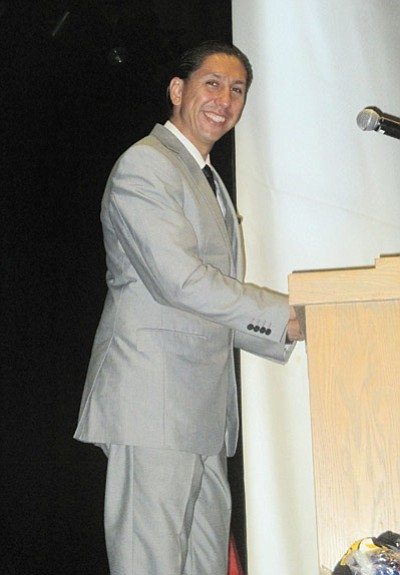Hopi school officials invite Nikishna Polequaptewa to empower youth
POLACCA, Ariz. – Nikishna Polequaptewa, keynote speaker for the Youth Convening session at Hopi Jr./Sr. High School, told students about growing up mostly without parents and living in poverty before finding success through education.
Dozens of students participated in the day long session Aug. 26 dealing with mentoring, service learning and cultural well-being. The Hopi Foundation, school officials and community members came together to identify ways to help students.
Born in Torrence, California, Polequaptewa recounted that his mom left when he was 1-year-old and his father went to prison when he was 3 years old. He was placed in the foster care system where he would stay in 15 foster homes in the next six months. He became used to packing his bag in one hour.

In these foster homes, Polequaptewa suffered neglect, abuse and was often told that he was “eating too much” because the foster parents were more interested in the paycheck then in him.
Polequaptewa, a Hopi Corps VISTA volunteer, finally stayed in one home for about two and a half years where he found “a little bit of love and that somebody cared for me.”
Polequaptewa lived with his dad after he was released from prison, even though they were poor. Sometimes they would have bread with ketchup on it for dinner. He would get broken G.I. Joe toys for Christmas. His brother took custody of him after he turned 21, but they lived in an area of Los Angeles where prostitutes and drug dealers were common.
He eventually moved out to Hopi to live with his auntie and went to Prescott for counseling – starting his way to success through education. He graduated from Sherman Indian High School before attending the University of California at Irvine and Central Washington University. Now he is majoring in earth science and environmental sustainability at Northern Arizona University.
“Sometimes the resources don’t exist and you have to create them,” he said. “If you put forth the effort then anything is possible. You can’t be crying around. You need to stand up.”
Administrators support Hopi Opportunity Youth Initiative
Hopi High Principal Charles Gover said the gathering was about improving education for all of the Hopi youth.
Bruce Talaswaima, master of ceremonies and KUYI radio personality, told the youth that the gathering was for them.
“This is for you to improve your educational career. Some of you have plans for when you graduate. Those who don’t should start making those plans,” he said.
Dr. Gregory Sackos, superintendent of Hopi Jr./Sr. High School, told the students that the gathering was there to address their needs.
“We are a school, but education is 24/7. The opportunity is out there for each and every one of you,” he said.
Monica Nuvamsa, executive director of the Hopi Foundation, said she graduated from Hopi High School and she was among the first generation that did not have to go to boarding school.
“I hope you realize the benefit of growing up here with your grandparents and community,” she said.
Nuvamsa spoke about Hopi Opportunity Youth Initiative (HOY), which was launched three years ago.
“We asked if we were ready to invest in and support our youth,” she said.
Nuvamsa urged the students to elevate their voice and make themselves the best young people that they can become.
The introduction to HOYI pathways included identifying the struggles, identifying how and who could help, and an update on where HOYI is going next.
There were several panels. The panel for service learning was led by Marshall Masayesva, program director for Adventures for Hopi; Lillian Hill, Hopi Tutskwa Permaculture; and Annalese Nasafotie, registered nurse.
The panel for cultural well-being was led by Iva Honeyestewa, owner/manager of Iskasokpu Gallery; Michael Adams, marketing and special events manager for the Hopi Education Endowment Fund; and Ruby Chimerica, Hopi artisan and public speaker.
The panel for mentoring was led by Paula Elmer, student at Coconino Community College; Gary Leslie, wellness manager for Native Americans for Community Action; and Tiffany Bahnimptewa, data entry clerk for The Hopi Foundation.
The theme was “No drop out point is too deep that a person can’t come out of it.”